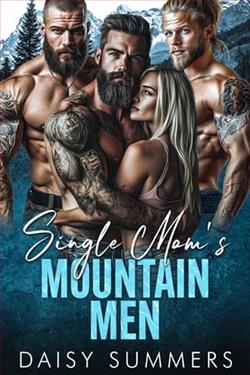Page 23 of Scarlet Thorns
“I love you, too, Dad.” I step back. “Tell Mom I said goodbye. I’ll call later so we can chat.”
But as I drive away, watching the beautiful colonial disappear in my rearview mirror, unease settles in my chest. He said not to worry about things that aren’t mine to carry.
But that’s exactly what I’m doing.
Because whatever’s happening with my body is only part of the problem. My father— my anchor, my hero, my safe harbor— is dealing with something he won’t let me help with.
And for the first time in my life, I don’t know if he can fix it by himself.
Chapter Nine
Ilona
The waiting room smells like disinfectant; it makes my nose wrinkle.
I sit in one of those generic beige chairs that populate every medical office in America, my knee bouncing with nervous energy I can’t seem to control. The magazines on the glass table beside me are months old— issues ofBetter Homes & GardensandHealththat someone probably selected to project optimism and wellness. I don’t touch them.
My hands are clammy despite the aggressive air conditioning that makes me wish I’d brought a sweater. The fluorescent lights overhead cast everything in harsh, clinical tones that make my skin look gray and tired. Fitting, since that’s exactly how I feel.
Yesterday was a marathon of tests— blood draws that left my arm purple and tender, ultrasounds with cold gel and uncomfortable pressure, hormone panels that required fasting until I felt dizzy. Each procedure carried its own small humiliation, its own reminder that my body has become something foreign and untrustworthy.
The worst part was the MRI. Forty-five minutes trapped in a metal tube while machinery thundered around me like artillery fire. I closed my eyes and tried to pretend I was somewhere else, but there’s no escaping the sound of your own body being dissected by technology.
What if it’s something serious?
The thought circles my brain like a vulture, refusing to land but never flying away.
What if it’s cancer?
What if it’s nothing and I’m just dramatic?
What if I waited too long?
I’ve been pushing these symptoms aside for months, telling myself they’d resolve on their own. Women deal with pain, my mother always said. It’s part of being female. But this goes beyond normal female experience— this feels like warfare conducted inside my own flesh.
“Ilona Shiradze?”
The nurse’s voice is soft, kind, nothing like the sharp efficiency I expected. She’s older, maybe sixty, with graying hair pulled back in a neat bun and scrubs decorated with tiny flowers. Her smile is genuine as she approaches.
“Dr. Khan is ready to see you now.”
My heart pounds as I stand, legs unsteady beneath me. The hallway stretches longer than it should, each step echoing off polished linoleum. Past exam rooms with closed doors, past medical equipment I can’t identify, toward answers I’m not sure I want to hear.
Dr. Khan’s consultation room is warmer than the waiting area— wood furniture instead of plastic, soft lighting instead of fluorescent harshness, actual artwork on the walls instead of motivational posters about wellness. He’s younger than I expected, maybe early forties, with kind eyes behind wire-rimmed glasses and the sort of calm demeanor that probably cost him years of practice.
“Please, sit.” He gestures to a comfortable chair across from his desk, then settles into his own with my file spread before him. “I know waiting for results can be stressful, so I’ll get straight to the point.”
My mouth goes dry.
Here it comes.
“Ilona, your results indicate that you have endometriosis.”
I stare at him.Endometriosis.I’ve heard it before, of course— whispered conversations between women, medical articles I’ve skimmed and forgotten. But hearing it applied to my body, my future, my life, makes everything else fade to static.
“It’s a chronic condition where tissue similar to the lining of your uterus grows in other areas of your pelvis,” Dr. Khan continues, his voice steady and professional. “This explains the pain you’ve been experiencing, the irregular cycles, the discomfort during intercourse.”
I hear the words, but they feel like they’re coming from underwater.Chronic.That means forever. That means this pain isn’t temporary, isn’t something I can push through and overcome with determination.















